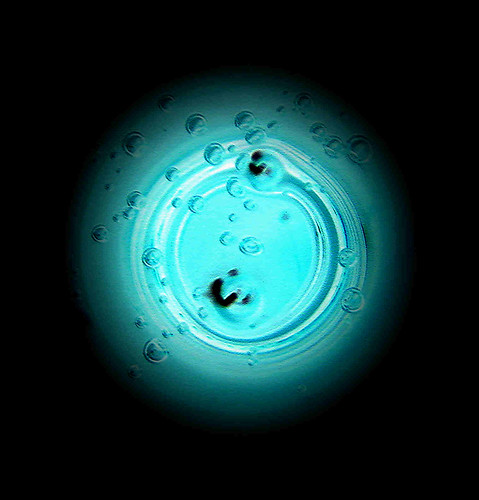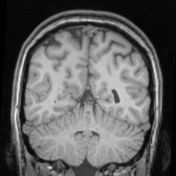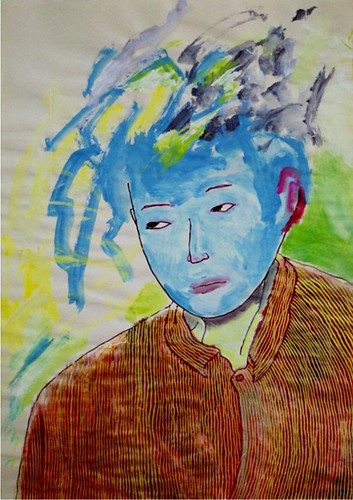Monday, June 18, 2007
Busy!
If there are any topics you would like to see covered, please leave a comment!
See you soon!
Tuesday, May 29, 2007
Werewolf Syndrome aka Congenital Generalized Hypertrichosis
In earlier eras, people afflicted with CGH would stay indoors during the day, going out only at night, to avoid being ostracized. Because of this behavior, people began to associate these unfortunate folks with werewolves, thus the vulgar name of Werewolf Syndrome. CGH is characterized, in its severest form, by thick hair covering the entire body, sparing the palms of the hands, and soles of the feet! Researchers believe the cause to be a genetic mutation, or an “awakening” of a very old, dormant gene-harkening back in evolution to hairier times!
CGH is extremely rare, with only about 50 documented cases since the Middle Ages. One of the first documented cases was found in French King Henry II’s court! King Henry was highly interested in human oddities and quirks of nature, and in 1547 was given, as a gift, a 10 year old boy who appeared to be half human, half animal. Four inch, thick blond fur covered his entire body, except for lips and eyes. The boy’s name was Pedro Gonzales, born in the
Researchers are familiar with other atavistic genetic behavior. Some rare examples include additional nipples, and small tail-like extrusions at the end of the spine. The defective gene in CGH is passed by both sexes, to 50% of their offspring. Typically, fetuses lose their fine body hair, called lanugo, by the end of the seventh and eight month of gestation. Babies afflicted with CGH are born with this body hair intact, which occasionally fades in adulthood, but typically lastis a lifetime.
Currently, the best known cases of CGH occurs in a family living in
“"This is probably a mutation of a gene that was a sleeping beauty," said Dr. Jose M. Cantu, head of genetics at the Mexican Institute for Social Security in
But Dr. Cantu and his colleagues emphasized that the idea of generalized hypertrichosis as an atavistic mutation was only a theory. "At this point it's strictly speculation, though the idea is a very interesting one," said Dr. Pragna I. Patel of the
Biologists have observed many other mutations that they suggest fall into this class of atavisms, the reappearance of normally dormant traits. Some people are born with multiple sets of nipples, for example, just as most nonprimate mammals have a double ridge of mammary tissue down the length of the underside of the torso. In very rare cases, girls develop entire extra breasts at puberty.
Other examples of atavistic mutations include the extension of the human coccyx into a small tail, the appearance of hind limbs in whales and the growth of extra toes on horses and cats.
"Atavistic mutations tell us that a lot of information is kept around for a very long time," said Dr. Brian K. Hall, a developmental biologist at
Read an interview with Chuy, a Mexican man with hypertrichosis.
http://www.listentome.net/stuff97.php
Five TV’s article on Chuy:
http://www.five.tv/programmes/hiddenlives/wolfboy/
Friday, May 18, 2007
Google Answers
 Here are more favorite Google Answers:
Here are more favorite Google Answers:Plantar fasciitis - do clogs or Birkenstocks help?
https://answers.google.com/answers/threadview?id=548720
Mixing bowls-glass or plastic?
https://answers.google.com/answers/threadview?id=542785
Whole body numbness
https://answers.google.com/answers/threadview?id=542273
Strong Bones
https://answers.google.com/answers/threadview?id=593399
Need change on death certificate
https://answers.google.com/answers/threadview?id=559238
Monday, May 14, 2007
Ipods and Pacemaker Malfunction?

The results of an Ipod's effects on cardiac pacemakers was presented recently at the Heart Rhythm Society, in Denver, Colorado. (Reported by the Denver Post). The senior author of the study was Dr. Jongnarangsin.
A study at the Thoracic and Cardiovascular Institute at Michigan State University found that an Ipod can cause pacemakers to malfunction by causing electro-magnetic interference.
What's interesting about this study is that it was prompted by a Jay Thaker, a high school student from Okemos, Michigan. Since Jay's mom is a rheumatologist, and his dad is an electrophysiologist, his interest in physiology is not not surprising. Jay had been pondering the idea of whether an Ipod could cause interference with pacemakers. When he and his dad searched online, they found no information. (Too bad Google Answers is among the dearly departed!)
When asked by one of his patients if there would be a problem using an Ipod with his pacemaker, Jay's father suggested he contact Dr. Krit Jongnarangsin, an assistant professor in the Division of Cardiovascular Medicine at the University of Michigan.
Dr. Jongnarangsin said that most patients with pacemakers are not Ipod users, but they could have children or grandchildren who do.
Read more :
Reuters
http://www.pcworld.com/article/id,131736/article.html&tk=nl_wbxnws#
MSNBC
http://www.msnbc.msn.com/id/18598054/
Monday, May 07, 2007
Cubital Tunnel

Everyone has heard about carpal tunnel these days, but few have heard about cubital tunnel! Cubital tunnel, like carpal tunnel syndrome, is a compressive neuropathy, meaning nerve pain from a stretched or compressed nerve.
Cubital tunnel is caused by pressure on the ulnar nerve, a primary nerve, supplying the hand. CT can cause numbness and tingling of the pinkie and ring fingers. Pain on the side of the arm closest to the chest can also occur in cubital tunnel.
The ulnar nerve reaches from the spinal cord to the hand and forearm and hand, including the skin on the on the outer portion of the hand. (The pinkie side). The ulnar nerve passes over a bony portion of the elbow (medial epicondyle) and when stretched, can cause tingling, even an electrical shock feeling, in the ring finger and pinkie!
How is cubital tunnel treated? The first step is to try and avoid bending the elbow for long periods of time. Don't lean on your elbows! Constant phone use can aggravate CT as the arm is bent while holding a phone-land line or cell! Surgery is the treatment of last resort... taking ibuprofen can help, and some claim that vitamin B6 (never more than 100mg per day) helps alleviate pain and tingling.
 Another home remedy is to roll the elbow in a towel, like a pig in a blanket. Wrap the towel with surgical tape or pin with safety pins. This will keep the elbow extended, not bent. Since many people are afflicted by CT due to bending their elbows while sleeping, this will prevent them from folding their arms, and alleviating pressure on the ulnar nerve.
Another home remedy is to roll the elbow in a towel, like a pig in a blanket. Wrap the towel with surgical tape or pin with safety pins. This will keep the elbow extended, not bent. Since many people are afflicted by CT due to bending their elbows while sleeping, this will prevent them from folding their arms, and alleviating pressure on the ulnar nerve.For more in-depth information about cubital tunnel, visit these links:
e-Medicine
http://www.emedicine.com/orthoped/topic479.htm
Hand University
http://www.handuniversity.com/topics.asp?Topic_ID=8
Monday, April 30, 2007
Canavan Disease
A rare genetic, degenerative disease, turning the brain into a spongy mush, describes Canavan disease. CD is named after Myrtelle Canavan, the researcher who in 1931 first described the condition. It afflicts infants, and death is common before the age of 4. Those that live a few years longer are prone to seizures and may suffer from blindness and paralysis. CD is most common among Ashkenazi Jews from eastern Poland, western Russia, Lithuania, and Saudi Arabians.
Symptoms such as hypotonia(abnormal muscle tone), macrocephaly (very large head), and head lag in an infant after the age of three to five months should raise a red flag to parents.
There is no real treatment, other than keeping the child well fed, hydrated, comfortable and maintaining an open airway.
You can learn more about Canavan Disease here:
Canavan Foundation
http://www.canavanfoundation.org/canavan.php
Information on other Jewish genetic diseases
http://www.canavanfoundation.org/ninediseases.php
Thursday, April 26, 2007
Carbonite
Do you recognize the Blue Screen of Death? If not, you will!
Today we're digressing from the usual topics to preview a product that many of us need, but didn't know about!

You've probably spent a lot of time organizing and collecting data on your PC or laptop. Do you do use your PC for bookkeeping? Are you writing the great American novel? Do you store family photos on your laptop? What if they were gone in a flash? If you're like me, you have a plethora of irreplaceable photos and tax and banking business stored on your hard drive. If your hard drive fails, where will you be?
Sure, I've burned things to CDs, but I'm not the best organizer. It would be hard to locate and re-organize all my work and downloads!
Recently I read about Carbonite Online back-up service, on the ScrapGirls site. I decided if a business with a huge amount of data to store trusted this service, I would learn more! I read about it, and decided to try it. I love it! I was at the point of buying another external hard drive, but the size I would need would cost over $500. Carbonite costs $5 per month, with no size limits. If you pre-pay for $49 for a year, it comes to $4.16 a month! I could not buy an external drive with enough life span to beat Carbonite's price!
Once you back up your hard drive, Carbonite does incremental back ups, meaning it will automatically back up the newest additions to your hard drive, and not start from the beginning! Stored files will have a small dot by them, so you KNOW they are backed up.
Restoring files is a snap! Your data is encrypted before it leaves your computer, so it is secure, and Carbonite also has redundant security, so you will never lose data!
You can Carbonite free for 15 days. The upload for the trial version is very slow, but worth it. You can still use your PC while backing up though! I highly recommend it! Click the Carbonite logo below to read more! You will be happy you did!
Wednesday, April 25, 2007
More Google Answers
Low-cost/Free health care in California
http://answers.google.com/answers/threadview?id=286637
Old fashioned vaporisers
http://answers.google.com/answers/threadview?id=324631
Mycosis Fungoides
https://answers.google.com/answers/threadview?id=337023
Combat Medic Equipment, circa 1943
http://answers.google.com/answers/threadview?id=327798
Tuesday, April 24, 2007
Mal de Debarquement (Disembarkement Syndrome)
Mal de Debarquement (Disembarkement Syndrome)
Imagine taking the cruise of your life! You feel pleased that you gained your 'sea legs' quickly, and have a wonderful time at sea. However, after getting home, on terra firma, you still feel as if you're walking on your sea legs! You feel somewhat disoriented, you feel you are still walking on a rocking ship! You may have the following syndrome:
Disembarkement Syndrome is not an uncommon condition that causes a sensation of movement, after one departs a train, ship, or even after lying on a water bed. It can last weeks or years! Medical researchers do not think the problem comes from the inner ear, as in some cases of vertigo and dizziness. In fact, people who suffer from disembarkment syndrome do not experience vertigo, dizziness, nausea, or vision problems.
These include:
1) Possible abnormal perception of linear acceleration, the result of a dysfunction of the otolith system—specifically the utricle;
2) A possible hormonal imbalance having an interaction with the vestibular system and brain, which would explain the greater female prevalence of the condition;
3) The central nervous system’s inability to integrate and adjust to the requirements of a new stable environment;
4) Hain, Hanna & Rheinberger7 suggest that, because of the gender distribution and the late onset of the symptoms, a psychogenic origin was unlikely (however, psychogenic factors cannot be totally dismissed).
http://www.hearingreview.com/issues/articles/2002-10_03.asp
http://www.wate.com/Global/story.asp?S=5994102
Tuesday, April 10, 2007
On Vacation
Monday, March 26, 2007
Google Answers

Retirement Syndrome
http://answers.google.com/answers/threadview?id=775777
Menstrual Cycle Woes
http://answers.google.com/answers/threadview?id=773391
Acute Intermittent Porphyria
http://answers.google.com/answers/threadview?id=769628
Allergy or Stress?
http://answers.google.com/answers/threadview?id=746380
Saturday, March 24, 2007
Finlay-Marks Syndrome (SEN)

SEN, or Finlay-Marks syndrome is also called Scalp, Ear and Nipple syndrome. Characterized by scalp, ear and nipple abnormalities, Finlay-Marks Syndrome is a rare, autosomal dominant condition, whose gene locus is still unknown. Those afflicted may have bumps on the scalp, underdeveloped and hypopigmented nipples, or even lack of nipples, and cupped or folded ears. Brittle fingernails and widely spaced teeth are other manifestations of this syndrome. Fortunately fewer than 200,000 people in the US are affected.
There is scant information about this disease online for free.
Read more here:
NCBI
http://www.ncbi.nlm.nih.gov/entrez/dispomim.cgi?id=181270
If you have SEN, (or any other rare or orphan disease) please contact the Making Contact website. This site allows people with like conditions to make email contact.
http://www.makingcontact.org/index.php?ci=602
Friday, March 16, 2007
Autistic Savants

Who hasn't seen "Rain Man" with Dustin Hoffman playing an autistic savant? The Autistic savant is afflicted by a fascinating psychological phenomena. Autistic savants are people with autism who posses extraordinary skills, beyond that of most non-affected individuals. Historically such people were termed "idiot savants", French for a very knowledgeable idiot. Savant Syndrome is sometimes shortened to "savantism" and individuals with Savant Syndrome abbreviated to savants.
Some of the exceptional skills autistic savants posses are superhuman memories, extraordinary musical skills, mathematical genious, and artistic talents.
"True photographic memory of the kind exhibited by Stephen Wiltshire is truly a rare but amazing gift. Mr. Wiltshire is an autistic savant and those that know him call him "the living camera". When he was 11 years old he drew a perfect representation of the aerial view of London after a single helicopter ride, down to the correct number of windows on the major buildings of the city."
You'll find Mr. Wiltshire drawing Rome from memory after a short helicopter ride over the Eternal City.
http://www.autoadviceoffl.com/Braindisease.htm
Read Stephen Wiltshire's bio here:
http://www.stephenwiltshire.co.uk/
Daniel Tammet is another autistic savant. "Daniel Tammet is an autistic savant. He can perform mind-boggling mathematical calculations at breakneck speeds. But unlike other savants, who can perform similar feats, Tammet can describe how he does it. He speaks seven languages and is even devising his own language. Now scientists are asking whether his exceptional abilities are the key to unlock the secrets of autism." Interview by Richard Johnson, Guardian Unlimited
http://www.guardian.co.uk/weekend/story/0,,1409903,00.html
+
Image from Flickr.com http://www.flickr.com/photos/kingofmonks/153565226/
Tuesday, March 13, 2007
More Google Answers
The Scoop on Skin Lightening Creams
http://answers.google.com/answers/threadview?id=762880
Does Coffee Cause Dry Skin? http://answers.google.com/answers/threadview?id=759663
Ankylosing Spondylitis
http://answers.google.com/answers/threadview?id=755590
Russian Orthodox Funerals http://answers.google.com/answers/threadview?id=748480
Monday, March 12, 2007
Munchausen Syndrome

Munchausen Syndrome is psychiatric disorder causing the sufferer to harm her/himself, or to "invent" an illness in order to garner attention. Munchausen by proxy is a variation of the disorder, when a person inflicts harm to another. Typically this is a mother who may cause her child or some other person who may be dependent on her, to exhibit symptoms - again to draw attention to herself.
Many Munchausen patients are very familiar with medical terms and will encourage their doctors to order tests or hospitalization. These patients are adept at faking symptoms. Detail oriented caregivers will notice that symptoms appear only after the patient is left alone! For example, a fever may appear after the patient has been alone; giving the patient time to falsely elevate their body temperature.
The exact cause is not completely clear. Some believe it is psychological in origin, perhaps due to child neglect and/or abuse.
Read more from the Cleveland Clinic
http://www.clevelandclinic.org/health/health-info/docs/2800/2821.asp?index=9833
Saturday, March 10, 2007
Blue Skin Syndrome (Methemoblobinemia)
Until the 1960's or so, a family of French ancestry known as the Blue Fugates, lived in Kentucky. They were so called because of their blue tinted skin. The family seemed to live normally, with life spans of 80 or more years. Because it had been passed on for so many generations, it was assumed to be hereditary. Local folks thought the family suffered from heart or lung disease. In fact, these people did have trouble breathing and lightheadedness, but these symptoms were the result of their syndrome, and not the cause.
We now know it was methemoglobinemia. Methemoglobinemia is primarily genetic, but one can acquire this syndrome from the intake of excessive nitrites (used to preserve meats), contaminated well water, silver nitrate (Used to treat burns and infections), ingestion of mothballs and even from eating too many carrots or spinach! (I wonder how Popeye avoided this!)
Simply put, hemoglobin that is present in our red blood cells, carries oxygen to all parts of our body. In methemoglobinemia, the hemoglobin is unable to carry sufficient oxygen to the tissues of the body, and a bluish color of the skin occurs.
Sometimes the blue skin color appears to be brown, especially around the lips and mucus membranes. This is known as "chocolate cyanosis", and is thought to be due to the brownish color of the blood.
Read more here:
http://www.mc.uky.edu/ahec/skyahec/methem-CE.htm
http://www.emedicine.com/ped/topic1432.htm
Monday, March 05, 2007
Google Answers

How Moles are Removed
http://answers.google.com/answers/threadview?id=744158
Macular Degenerations and Stem Cells
http://answers.google.com/answers/threadview?id=735450
Curing Mouth Sores
http://answers.google.com/answers/threadview?id=714249
Sunday, March 04, 2007
Foreign Accent Syndrome

This is a very rare, curious syndrome that strikes people who have had a stroke or other brain injury- multiple sclerosis has also been thought to trigger FAS. In some patients, after a stroke, they may suddenly begin speaking their native language with a foreign accent! Many of these patients claim never to have heard the language from which their accent is derived!
The condition often clears up on its own, but many doctors believe it is more psychiatric in nature than an organically caused syndrome. Recently researchers at Oxford University have found small areas of brain damage, affecting the pre-motor and motor areas in patients that suffer from FAS. These minute brain injuries may be causing subtle changes to how voice is expressed-causing altered pitch or syllables with different pronunciations.
For additional reading on Foreign Accent Syndrome:
ASHA
http://www.asha.org/about/publications/leader-online/archives/2006/060815/f060815c.htm
Eureka Alert
http://www.eurekalert.org/pub_releases/2003-11/uocf-ucd111803.php
Wednesday, February 21, 2007
Jumping Frenchman of Maine Disorder

http://farm1.static.flickr.com/107/313712999_79949fc7ff_o.jpg
Jumping Frenchman of Maine Disorder - This disorder is caused by a mutation of the genes that regulate the nervous system, causing a person with this disorder to exhibit extremely over exagerated responses when startled.
Another facet of this disorder is an automatic response to a command, delivered in a stern voice. For example, if someone barked an order to throw down a cup of hot coffee, the patient will do so in spite of the consequences.
From Answers.com: "
The "Jumping Frenchmen" seemed to react abnormally to sudden stimuli. Beard recorded, for instance, individuals who would obey any command given suddenly, even if it meant striking a loved one, and repeat back unfamiliar or foreign phrases uncontrollably. Beard also noticed that the condition was often shared within a family, suggesting that it was inherited.
The interest sparked by Beard's publication about the disorder inspired Georges Gilles de la Tourette to investigate what later became known as Tourette's syndrome. Further studies of the condition in the 1980s, however, cast doubt on whether the "Jumping Frenchmen" phenomenon was in fact a physical condition like Tourette's. Documentation of direct observation of "Jumping Frenchmen" has been scarce, and while videotape evidence was recorded by several researchers that showed the condition to be real, Saint-Hilaire concluded from studying eight affected people that it was brought on by conditions at their lumber camps and was psychological, not neurological."
http://www.answers.com/topic/jumping-frenchmen-of-maine
Friday, February 16, 2007
More Google Answers
http://answers.google.com/answers/threadview?id=775777
Hair Treatment
http://answers.google.com/answers/threadview?id=771120
Using Plastic in the Microwave
http://answers.google.com/answers/threadview?id=286529
Gall Bladder Surgery
http://answers.google.com/answers/threadview?id=542751
Curtain Hooks & Coins
All types of odd things are swallowed by disturbed and intoxicated folks!
This picture is an x-ray of a 62 year old Frenchman, who died after swallowing 350 coins!
The complete story can be found here:
http://www.stunning-stuff.com/read-weird-news-stories/41.html?ci=6
Bruce Goldfarb writes about some unusual cases, such as the man who impaled a power drill in his brain. Even so, he had the where with all to press the reverse switch on the drill to remove it!
http://www.brucegoldfarb.com/strange.htm
Thursday, February 15, 2007
Spontaneous Remission

Breast Cancer Cells
Photo courtesy of Flickr
http://www.flickr.com/photo_zoom.gne?id=135618851&context=photostream&size=o
"Memorial Sloan-Kettering President Lewis Thomas, MD, once said: "The rare but spectacular phenomenon of spontaneous remission of cancer persists in the annals of medicine, totally inexplicable but real, a hypothetical straw to clutch in the search for cure. . . . No one doubts the validity of the observation."
"Up to 19 percent of some cancers heal themselves, researchers discover. It baffles doctors — but it may be the key to understanding the power of the mind."
http://www.prweb.com/releases/2006/1/prweb332593.htm
Placebo effect or some biochemical connection?
" A number of papers discuss possible mechanisms by which spontaneous remission of cancer might occur. The most popular suggestion is some form of immunological reaction, though this is still unproven (Lokich J, 1997; Heim ME, Kobele C, 1995). There seems to be a connection between fever and remission of cancer (Murakawa M et al., 1990); fever in childhood or adulthood may protect against the later onset of cancer and spontaneous remissions are often preceded by feverish infections (Kleef R et al., 2001). The case of remission following myxoedema coma (Hercbergs A, 1999) suggests that hypothyroidism may trigger apoptosis (cell death) in tumours. Yet another idea is that DNA methylation, which is involved in cell differentiation, may play a part (Sugimura T, Ushijama T, 2000). And there is a long-standing impression that psychological states influence the functioning of the immune system.
In summary, then, while the mechanisms of spontaneous remission are by no means fully understood, there are plausible suggestions to explain the phenomenon."
http://www.acampbell.ukfsn.org/essays/skeptic/miraculouscures.html
For more information, visit these sites:
Ivanhoe
http://www.ivanhoe.com/channels/p_channelstory.cfm?storyid=13064
Spontaneous Remissions
http://www.majidali.com/remissio.htm
Tuesday, February 13, 2007
Some Favorite Google Answers

Breast Cancer Treatment Options http://answers.google.com/answers/threadview?id=767724
How a stingray barb kills people http://answers.google.com/answers/threadview?id=762521
Who discovered estrogen and testosterone? http://answers.google.com/answers/threadview?id=748544
Fertility and Infertility literature http://answers.google.com/answers/threadview?id=747786
Monday, February 12, 2007
Humor

In the hospital, a patient's relatives gathered in the waiting room, where their family member lay gravely ill. Finally, the doctor came in looking tired and somber. "I'm afraid I am the bearer of bad news," he said as he surveyed the worried faces. "The only hope left for your loved one at this time is a brain transplant. It's an experimental procedure, semi-risky, and you will have to pay for the brain yourselves."
The family members sat silent as they absorbed the news. At last, someone asked, "Well, how much does a brain cost?"
The doctor quickly responded, "$200 for a female brain, and $500 for a male brain."
The moment turned awkward. Men in the room tried not to smile, avoiding eye contact with the women, but some actually smirked. A girl, unable to control her curiosity, blurted out the question everyone wanted to ask, "Why is the male brain so much more?"
The doctor smiled at her childish innocence and then said, "It's a standard pricing procedure. We have to mark the female brains down, because they're used!"
Sunday, February 11, 2007
Alström Syndrome
 Alström Syndrome is a very rare genetic disease, with only 431 reported cases worldwide, with more cases reported in Holland and Sweden, than the US. A child must inherit the gene from both parents to be affected, as this is an autosomal recessive inherited disorder.
Alström Syndrome is a very rare genetic disease, with only 431 reported cases worldwide, with more cases reported in Holland and Sweden, than the US. A child must inherit the gene from both parents to be affected, as this is an autosomal recessive inherited disorder.Infants present with rapid back and forth motion (nystagmus) and light sensitivity (photophobia) which leads to retinal disintegration. Children gain weight, becoming obese. As they grow, most organs are affected as blindness and hearing loss sets in. Type 2 diabetes, liver and heart failure, pulmonary fibrosis and kidney failure often follow.
Hypothyroidism, scoliosis and short stature are other signs of Alström Syndrome
From the Alström Syndrome International web site:
The following manifestations are observed in most Alström Syndrome cases:
- nystagmus and photodysphoria in early infancy
- progressive pigmentary retinopathy (cone-rod dystrophy) leading to blindness
- childhood obesity, often moderating to high-normal weight in adulthood
- mild to moderate bilateral sensorineural hearing loss
- congestive heart failure secondary to dilated cardiomyopathy in infancy or early adulthood
- normal extremities / absence of polydactyly or syndactyly
- hyperinsulinemia / insulin resistance
- non-insulin dependent diabetes mellitus (Type 2 diabetes or NIDDM) developing in early adulthood
- progressive chronic nephropathy that presents as tubular dysfunction
- normal intelligence with some reports of delayed early developmental milestones
For additional information, visit this Medline site:
http://www.nlm.nih.gov/medlineplus/ency/article/001665.htm
Saturday, February 10, 2007
Fibrodysplasia Ossificans Progressiva

This is another rare genetic disease, affecting only 1 in 2,000,000 people globally. Simply put, the white blood cells mistakenly destroy healthy muscle tissue instead of invading bacteria. Not only that, but a protein called BMP, normally used to build normal bone, begins to ossify (turn to bone) muscle.
Researchers suspect that the gene responsible for forming fetal bone fails to "switch off" and continues attempting to produce bone. The exact gene has not yet been discovered.
Picture from Mütter Museum, College of Physicians of Philadelphia. Reprinted from the New England Journal of Medicine
http://www.uphs.upenn.edu/ortho/oj/1998/oj11sp98p59.html
Read more here:
USCF Children's Hospital
http://www.ucsfhealth.org/childrens/medical_services/cancer/fop/index.html
and
NCBI
http://www.ncbi.nlm.nih.gov/books/bv.fcgi?rid=gnd.section.252
Williams Syndrome

Williams Syndrome is a rare genetic disease, caused by a deletion of genes on chromosome 7. There is no cure, and the condition manifests itself with elevated calcium levels during infancy. As children Williams Syndrome kids display over-friendliness, with no fear of strangers. Mild to moderate retardation and cardiovascular disease are other symptoms of this disease. WS patients are often short in stature, with distinctive facial features, including a wide mouth, small chin, eye puffiness and a short nose.
Photo courtesy of FreeDigitalPhotos
http://www.freedigitalphotos.net/displayimage.php?album=lastup&cat=0&pos=917
For more information, visit:
The Williams Syndrome Association
http://www.williams-syndrome.org/
and
NCBI-Johns Hopkins University
http://www.ncbi.nlm.nih.gov/entrez/dispomim.cgi?id=194050
Some Favorite Google Answers

Duct Tape as a Bandage?
http://answers.google.com/answers/threadview?id=769317
Cheetos or Carrots as Best Survival Food?
http://answers.google.com/answers/threadview?id=767683
Tattoo Removal
http://answers.google.com/answers/threadview?id=767683
West Nile Update
According to the CDC, as of 3am, February 6, 2007, there were 4,219 human cases of West Nile in the US. Visit the CDC Disease map to see how your state rates. Simply click on your state to get figures from each county.
http://diseasemaps.usgs.gov/wnv_us_human.html
Your risk of contracting WNV (West Nile Virus) is very low, and less than 1%, of those infected go on to develop serious symptoms, according to the NBII. Of course, very young children, the elderly and those with a compromised immune system are highest at risk,
http://westnilevirus.nbii.gov/index.html
To avoid WNV:
- clear out any standing water and debris from around your home.
- wear long sleeves, long pants and shoes and socks when outdoors in a mosquito infested area
- stay indoors from dusk to dawn, peak mosquito activity time
- use a DEET ( N,N-diethyl-meta-toluamide) containing mosquito repellant
- repair holes in window screens
- report dead birds to your local health authorities. Do not handle the dead birds yourself!
Alice-in-Wonderland Syndrome (AIWS)

Alice-in-Wonderland Syndrome is so named, because patients afflicted with this disorder perceive themselves and their surroundings as distorted. Body shapes, buildings, and even time seems surreal. Hands, heads and legs may appear to be growing, or “morphing” into odd shapes to these patients. Patients may report they feel like they are walking on a treadmill, or walking on sponges. Perspectives and distances are seen as longer or shorter than they are. Often seen in children, this mental illness can be seen in adults as well.
AIWS is beleived to be triggered by epilepsy, migraine headaches, or even the “mono” virus-Epstein-Barr; all of which can cause irritations or dysfunction of brain neurons.
Photo courtesy of FreeDigitalPhotos
http://www.freedigitalphotos.net/displayimage.php?album=10&pos=2
For more information, visit:
The Register
http://www.theregister.co.uk/2006/12/01/the_odd_body_aws/







